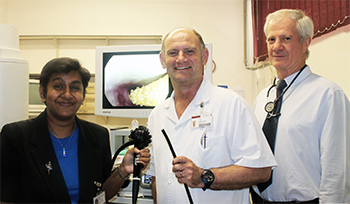Latest News Archive
Please select Category, Year, and then Month to display items
![]()
RAG has a new
name and format:
ACT—
Active, Civic, Teaching.
The University of the Free State (UFS) is ready to kick off the new year with a bang. Get ready to celebrate the start of university with a cause. RAG, as you know it, has a new name and format: ACT—Active, Civic, Teaching.
You get further if you pull in the same direction, rather than various good-intentioned movements on different routes. In a collective effort, four exciting programmes will take flight, which are listed below:
- Schools project for first-year students: mentored by senior students, groups of first-year students will be assigned to, and participate in local school projects. Students will learn to solve problems and work together in small groups as they collaborate on a specific community project involving primary or secondary schools in the Mangaung region.
- Community gardens: This project will help individual student communities to begin and maintain their own vegetable gardens in order to address food insecurity within their own environment.
- Eco-vehicle project for senior students: The aim of the eco-vehicle project is to create an interdisciplinary experience. Undergraduate senior students from a Student Life College (SLC) can work together to build an eco-vehicle from waste material. The track day, along with creative pit stops, will take place on 16 February 2018, preceding the Community celebration of 17 February 2018.
- Community celebration: To foster good relationships between the UFS and the community, we aim to host an annual celebration that will be open to the broader Mangaung community. The celebrations will kick off on the morning of 17 February 2018 with a business relay and a showcase of the eco-vehicles. The festive day will conclude with an evening music concert.
Keep checking the UFS website for updates about more ACT activities during the month of February.
Gastroenterology Unit works to bring a transformative impact to healthcare
2016-11-21

Dr Rita Nathan, Acting CEO of Universitas Hospital,
Prof Willem Kruger, Acting Head of the
School of Medicine, and Prof Jan van Zyl,
Head of Department of Internal Medicine.
Photo: Nonsindiso Qwabe
The departments of Surgery and Internal Medicine at the University of Free State launched the newly upgraded Gastroenterology Unit of the Universitas Academic Hospital on 8 November 2016. Realising the need to provide state-of-the-art equipment that caters for various health needs, the unit has acquired new pieces of equipment worth R7 million. Through the equipment, a move towards the digital revolution, the unit hopes to bring about a transformative impact on healthcare service delivery in central South Africa and its surrounds.
Upgraded unit will make a difference on burden of diseases
Dr Rita Nathan, Acting CEO of the Universitas Hospital, said the increase in the number of scopes, and the improvement in technology, will facilitate improved service delivery to the community of the Free State and beyond. “This upgrade will enable the unit to make a tremendous dent in the burden of diseases in the communities we serve.”
Unit a unique feature in central South Africa
Serving a population from the Free State, Northern Cape, Eastern Cape and Lesotho; the growing demand of health services has led to an increase in the number of patients treated by the unit. This unit is unique in central South Africa as the only one providing endoscopic intervention for cases like gastrointestinal bleeding. It is also the only 24-hour gastroscopic service available in the state sector.
Improved service delivery linked to enhanced training platforms
Prof Willem Kruger, acting head of the School of Medicine, said that the upgrading of equipment will have an immense impact on not only service delivery, but also on training platforms in the latest technologies. “It important, as a university, that our doctors have the latest technology at their disposal to facilitate training. If training improves, service delivery improves. The two on inextricably linked.” he said.